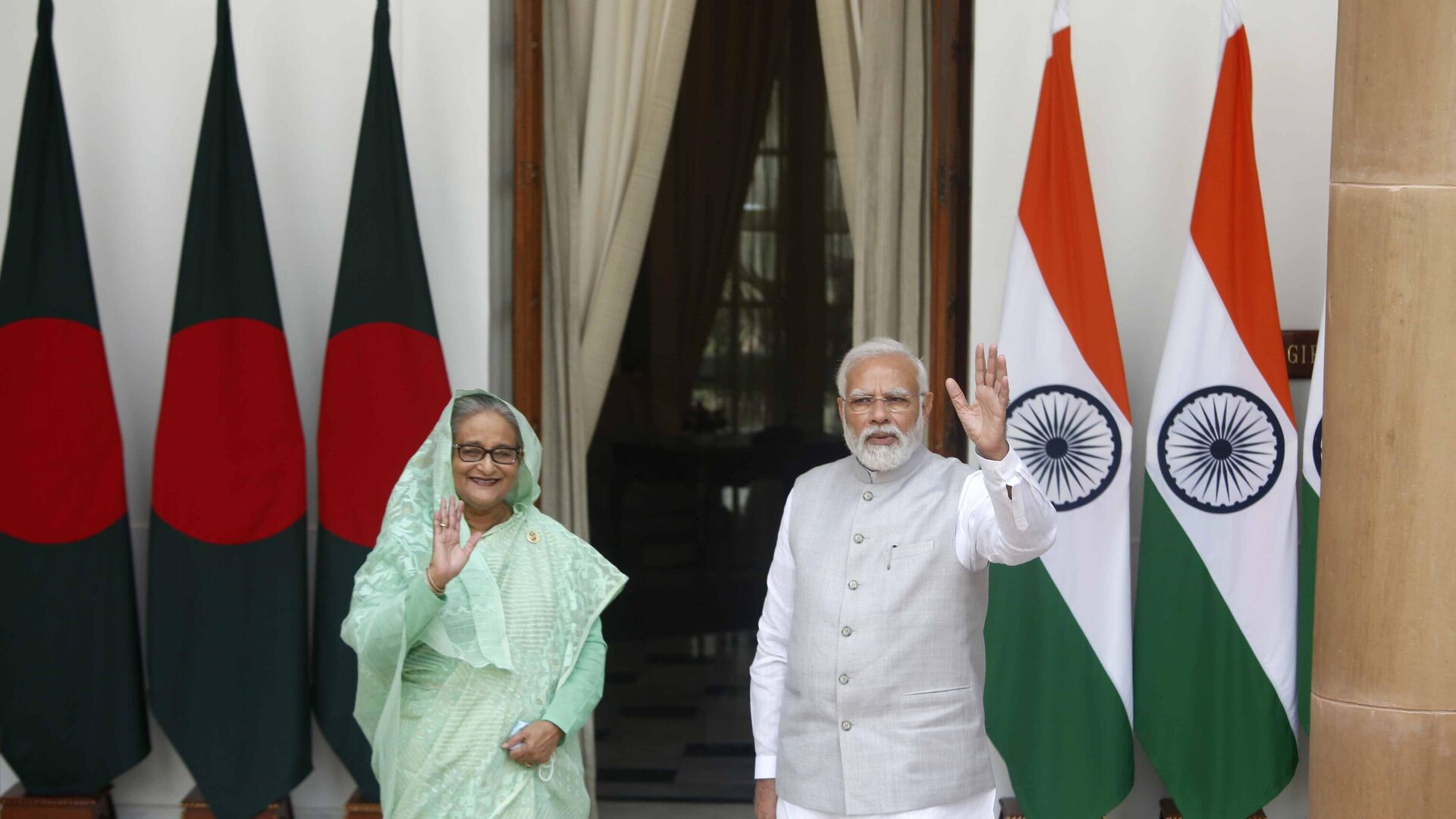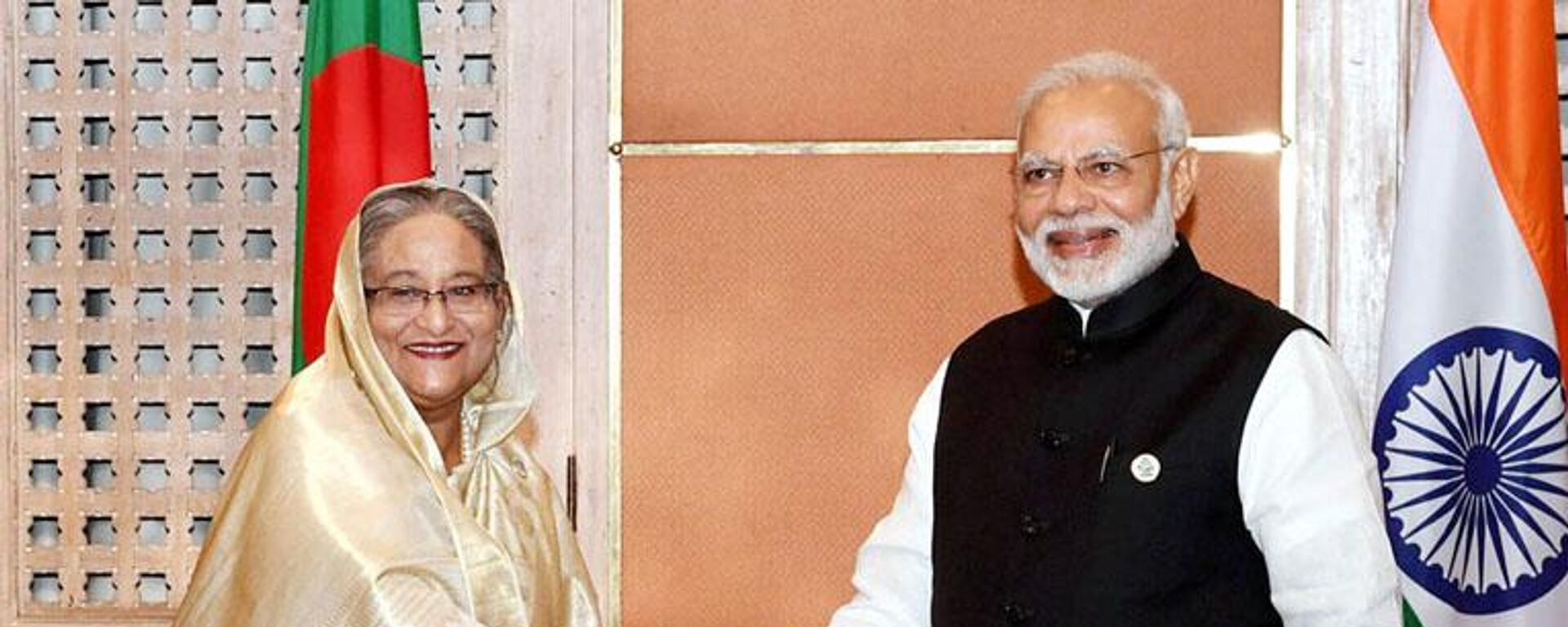https://sputniknews.in/20240807/how-sheikh-hasinas-ousting-impacts-india-bangladesh-defence-ties-7971463.html
How Sheikh Hasina's Ousting Impacts India-Bangladesh Defence Ties
How Sheikh Hasina's Ousting Impacts India-Bangladesh Defence Ties
Sputnik India
The India-Bangladesh cooperation in defence domain will be unaffected due to the recent political churning in Dhaka that resulted in the ouster of five-time Prime Minister Sheikh Hasina from power, geopolitical experts have said.
2024-08-07T15:54+0530
2024-08-07T15:54+0530
2024-08-08T07:52+0530
sputnik opinion
india
bangladesh
new delhi
bangladesh nationalist party
sheikh hasina
dhaka
delhi
south asia
s. jaishankar
https://cdn1.img.sputniknews.in/img/07e8/02/09/6497261_0:160:3072:1888_1920x0_80_0_0_7d45c85e39a1407796539266f71d7a9d.jpg
The India-Bangladesh cooperation in defence domain will be unaffected due to the recent political churning in Dhaka that resulted in the ouster of five-time Prime Minister Sheikh Hasina from power, geopolitical experts have said.The India-Bangladesh relations in the military sphere will remain stable, as they will not be affected by the political climate, according to Abhijit Iyer-Mitra, a senior fellow at the New Delhi-based think tank Institute of Peace & Conflict Studies.Besides, there was a lot of institutional trust between the two militaries because in Bangladesh it is the military that carries all the power. That's the reason, there's very little that can be done in the context of overruling military interest, he reckoned.The expert believes, nobody has the guts in Bangladesh to take on the military, which is why there cannot be any interference in military contracts with India.Meanwhile, in the last few months, Bangladesh increased its defence partnership with India, having signed a deal to procure an advanced tug from India's state-run shipyard Garden Reach Shipbuilders & Engineers Ltd (GRSE) under a $500 million credit line extended by New Delhi to Dhaka.In addition to that, Bangladesh was in advanced talks to procure offshore patrol vessels and receive spares for its fleet of MiG-29 aircraft from India.Notably, Bangladesh Army Chief General Waker-Uz-Zaman, who took over the reins of the nation from Hasina, was all set to travel to India later this month to expand the military cooperation between the two neighboring states.Waker-Uz-Zaman, perceived to be pro-India, had been co-chairing the bilateral annual defence dialogues with New Delhi before Hasina's departure.Likewise, Indian Army veteran, Major General (Retd) Prabdeep Singh Behl, thinks that military-to-military cooperation that exists between India and Bangladesh will continue hitherto fore.He stated that over time, the two countries have got closer on various fronts. Like Bangladesh has been part of Vijay Diwas functions which are marked to celebrate India's victory over Pakistan in the 1971 war.ye nOn the other hand, military author, Major General (Retd) Anil Senger, observed that India-Bangladesh defence cooperation has been progressive with high-level visits, including interactions between the chiefs of staff of the tri-services.* terrorist organization banned in Bangladesh
https://sputniknews.in/20240806/western-interference-in-bangladesh-sparks-warning-sign-for-india-7968154.html
india
bangladesh
new delhi
dhaka
delhi
south asia
china
russia
Sputnik India
feedback.hindi@sputniknews.com
+74956456601
MIA „Rossiya Segodnya“
2024
Pawan Atri
https://cdn1.img.sputniknews.in/img/07e6/0c/13/139630_147:0:831:684_100x100_80_0_0_8fa2b25903e7787fe6a2698552c167df.png
Pawan Atri
https://cdn1.img.sputniknews.in/img/07e6/0c/13/139630_147:0:831:684_100x100_80_0_0_8fa2b25903e7787fe6a2698552c167df.png
News
en_IN
Sputnik India
feedback.hindi@sputniknews.com
+74956456601
MIA „Rossiya Segodnya“
Sputnik India
feedback.hindi@sputniknews.com
+74956456601
MIA „Rossiya Segodnya“
Pawan Atri
https://cdn1.img.sputniknews.in/img/07e6/0c/13/139630_147:0:831:684_100x100_80_0_0_8fa2b25903e7787fe6a2698552c167df.png
prime minister of bangladesh, sheikh hasina, indian external affairs minister, s. jaishankar, sheikh hasina's fall, bangladeshi army, bangladesh nationalist party, bnp, jamaat-e-islami bangladesh, bangladesh army, sectarian groups, sheikh hasina's, north-eastern india, drug mafias, hawala to jamaat, bangladeshi unrest, bangladesh protests, sheikh hasina news, hasina news, india bangladesh military cooperation, india bangladesh military relations, india bangladesh defence cooperation, india bangladesh defense cooperation, garden reach shipbuilders & engineers ltd, grse,
prime minister of bangladesh, sheikh hasina, indian external affairs minister, s. jaishankar, sheikh hasina's fall, bangladeshi army, bangladesh nationalist party, bnp, jamaat-e-islami bangladesh, bangladesh army, sectarian groups, sheikh hasina's, north-eastern india, drug mafias, hawala to jamaat, bangladeshi unrest, bangladesh protests, sheikh hasina news, hasina news, india bangladesh military cooperation, india bangladesh military relations, india bangladesh defence cooperation, india bangladesh defense cooperation, garden reach shipbuilders & engineers ltd, grse,
How Sheikh Hasina's Ousting Impacts India-Bangladesh Defence Ties
15:54 07.08.2024 (Updated: 07:52 08.08.2024) With Sheikh Hasina fleeing Bangladesh following deadly protests that killed hundreds in her country, uncertainty surrounding Dhaka's defence ties with New Delhi seems to have appeared in the air. Sputnik India analyses how her exit impacts military relations between the neighbouring states.
The India-Bangladesh cooperation in defence domain will be unaffected due to the recent political churning in Dhaka that resulted in the ouster of five-time Prime Minister Sheikh Hasina from power, geopolitical experts have said.
The India-Bangladesh relations in the military sphere will remain stable, as they will not be affected by the political climate, according to Abhijit Iyer-Mitra, a senior fellow at the New Delhi-based think tank Institute of Peace & Conflict Studies.
"Moreover, India can only fulfill some of Bangladesh's needs in the defence sector. For instance, only Beijing or Moscow can offer advanced technology equipment like fighter aircraft, ships, and submarines to Dhaka. India cannot fill that slot and therefore, it is not in competition with anybody in this sphere," Mitra told Sputnik India on Wednesday.
Besides, there was a lot of institutional trust between the two militaries because in Bangladesh it is the military that carries all the power. That's the reason, there's very
little that can be done in the context of overruling military interest, he reckoned.
The expert believes, nobody has the guts in Bangladesh to take on the military, which is why there cannot be any interference in military contracts with India.
Meanwhile, in the last few months, Bangladesh increased its defence partnership with India, having signed a deal to procure an advanced tug from India's state-run shipyard Garden Reach Shipbuilders & Engineers Ltd (GRSE) under a $500 million credit line extended by New Delhi to Dhaka.
In addition to that, Bangladesh was in advanced talks to procure offshore patrol vessels and receive spares for its fleet of MiG-29 aircraft from India.
"The Bangladesh military understands that their country is surrounded by India from all sides. For a long time, it used to be anti-India but in the last 20-30 years, they have seen New Delhi as a partner," the international relations commentator underlined.
Notably, Bangladesh Army Chief General Waker-Uz-Zaman, who took over the reins of the nation from Hasina, was all set to travel to India later this month to expand the military cooperation between the two neighboring states.
Waker-Uz-Zaman, perceived to be pro-India, had been co-chairing
the bilateral annual defence dialogues with New Delhi before Hasina's departure.
"I would not say Waker-Uz-Zaman as pro-India, he's pro-Bangladesh, which means he's pro-stability. He's not for picking useless fights just to support the anti-India rhetoric of his political masters if at all there is anti-India rhetoric that comes out of the new government. Remember, the Bangladesh Nationalist Party (BNP) and Jamaat-e-Islami* used to do that in the past. So, the Bangladesh Army chief will not go to sacrifice the security interests of his nation for some cheap politicking," Mitra remarked.
Likewise, Indian Army veteran, Major General (Retd) Prabdeep Singh Behl, thinks that military-to-military cooperation that exists between India and Bangladesh will continue hitherto fore.
He stated that over time, the two countries have got closer on various fronts. Like Bangladesh has been part of
Vijay Diwas functions which
are marked to celebrate India's victory over Pakistan in the 1971 war.ye n
"Concerning acquiring military equipment from India, there is a realisation in the Bangladesh military that too much reliance on China will get them into a debt trap and they would like to avoid such a situation. Though Dhaka may increase their interaction with Beijing, it will not lessen its interaction with New Delhi," Behl suggested.
On the other hand, military author, Major General (Retd) Anil Senger, observed that India-Bangladesh defence cooperation has been progressive with high-level visits, including interactions between the chiefs of staff of the tri-services.
"Plus, Bangladesh officers attend courses in India at different levels. Thus, it is expected that continuity will prevail. It is also a kind of compulsion for Bangladesh given the long border with India," Sengar concluded.
* terrorist organization banned in Bangladesh



